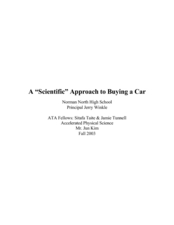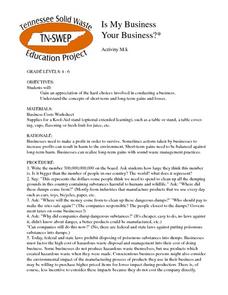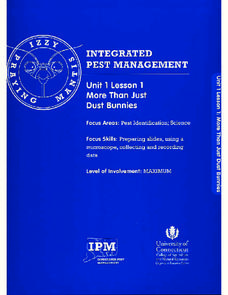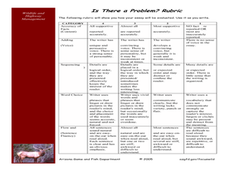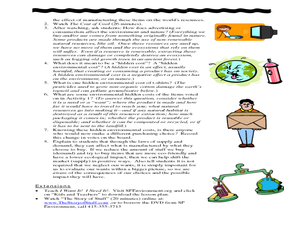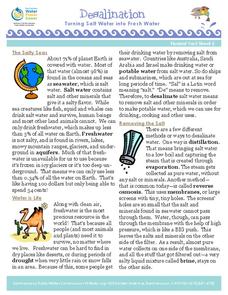Curated OER
Close Observation: Coins
Integrate math, science, and speaking/listening with a collaborative hands-on activity. Each group works with a single penny, examining it with the naked eye and recording observations. Repeat using magnifying glasses. Then repeat with a...
Curated OER
Dumptown, USA: Making a Ton of Difference
Students investigate the recycling system in the United States by participating in an online activity. In this environmental care lesson, students research what makes up our trash output in this country and where it goes....
Curated OER
High-Definition Digital Television: Why Make the Switch?
In this digital television worksheet, students read about the advantages of using digital television. They answer three critical thinking questions about the advantages and disadvantage of digital television.
Curated OER
A “Scientific” Approach to Buying a Car
Students examine what it takes to purchase a car and the resources out there to help find what you are looking for. In this scientific method lesson students complete different problem solving situations.
Curated OER
Is My Business Your Business?
Students examine how businesses practice sound waste management. They discuss how to plan a business, identify how to make the least impact on the environment in planning a Kool-Aid stand, and complete Business Costs Worksheets for the...
Curated OER
Save the Earth: It's Everyone's Home!
Students demonstrate how to make earth-smart choices. In this environmental awareness lesson, students listen to a short lecture on environmentally friendly products. Students invent an environmentally friendly product and complete an...
Curated OER
Family Member
In this worksheet on family members, students describe what is meant by family, their duty to family, and family meetings. In addition, they create a budget for their family for one month keeping track of all expenses for 7 days....
University of Connecticut
More Than Just Dust Bunnies
Teenagers will never complain about cleaning their rooms after this activity. In the first lesson of a four-part series, budding scientists collect samples of dust, chalk, and other particulates from various areas of the classroom....
Michigan State University
Friend or Foe?
What one person thinks is a pest may not be a pest to someone else. Here, scholars examine the characteristics of living things and pests through grand conversation and a variety of activities. Class members play a game of pest or not a...
Curated OER
Water Quality Issues
In this unit of lessons, students examine water quality issues. They discover ways they can conserve water and practice making drinkable water from water desalination.
Curated OER
Minerals of The Earth's Crust
For this earth science worksheet, middle schoolers find the vocabulary words related to minerals by unscrambling the letters. They also complete other word puzzles.
Curated OER
Is There a Problem with Wildlife on our Roads?
Learners create a graph and analyze it to see if the data shows there is a problem with wildlife on the roads. In this wildlife collision lesson students write an essay to support their conclusions.
Curated OER
Travel Brochure for a Cell
High schoolers create a brochure to entice readers to 'visit' their cell organelles and functions 'amusement park'. Students use humor and 'roadside attractions' for an inspiration - 'visit the ribosomes to watch proteins synthesized...
Curated OER
A Home Energy Audit
Students investigate ways to save energy. In this environmental lesson, students play the role of a building inspector and identify "culprits" that waste energy. Students use a checklist to identify specific practices that waste energy.
Curated OER
The True "Cost of Cool!"
Eighth graders study hidden environmental costs in things we buy. In this consumerism lesson students watch a video about consumerism and analyze advertisements in teen magazines.
San Francisco Public Utilities Commission
Desalination: Turning Salt Water into Fresh Water
How does San Francisco supply its citizens with enough water, even during a drought? Learn about reservoirs and why desalination could be a good solution with a reading passage about water conservation. After kids finish the...
Curated OER
Why Eat Organic?
Ninth graders explore the concept of organic eating. In this environmental stewardship lesson, 9th graders compare and contrast organic foods with conventional foods and discuss the benefits of eating organic foods.
Curated OER
Creepy, Crawly Critters
Students study characteristics of insects by creating models from an assortment of materials. They create rubrics showing what an insect must have and create an insect, using a bag of materials. They cut out the puzzle insects included...
Curated OER
Nerve Cell Informercials
Students research the structure and function of the nervous system. They prepare a model or representation of neural transmission. Students create an infomercial about nerve cells.
Curated OER
The Great Hubble
Students explain how Hubble telescope captures images from space. In this space science lesson, students use the internet to view space photos. They debate on an issue raised by the teacher.
Curated OER
Potato Ways
Learners analyze the packaging process. In this consumer awareness lesson, students analyze the process of packaging a potato and identify positive and negative ways of packaging. Learners study statistics on an overhead transparency to...
Curated OER
Where Did the Science Experiments Go?
Hands-on science experiments are essential for student learning.
Curated OER
Bridge Construction
Students build a model of a bridge and test the amount of weight it support. They identify different types of bridges: suspension, arch, girder, truss, cantilever, cable-stayed and moveable.
Curated OER
The Drag of Drag
Students are told that any object moving through a fluid (air, water, molasses, etc) experience a drag force which oppose the motion. They are given the summarized version of drag which is proportional to the square of the velocity....



